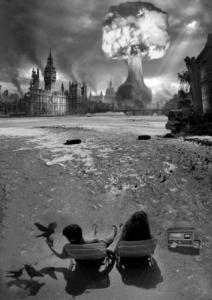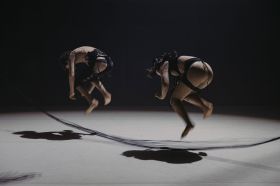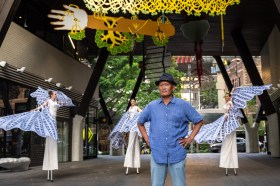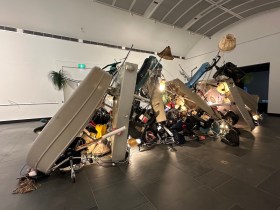But for the tiered seating that retreats from the underdressed stage, when entering the theatre, one might make the mistake that they had walked in to a hybrid club filled with bohemian misfits and the intergalactic misunderstood throwing back shots of smoking liquor” a subterranean setting where people might listen to a DJ mixing the low frequency radio static to a crowd of manga-type mutants dancing to the strobe effect of a single fluro bulb.
After the End was conceived by contemporary UK writer, Dennis Kelly, it premiered at the Edinburgh Fringe in 2005 and has since met wide acclaim throughout the world. Adelaide Feast’s Daniel Clarke makes his South Australian directorial debut after living as a theatre director in the UK for 4 years. After the Endstars Hannah Norris and Nick Pelomis. The production has received support from Arts SA and the Adelaide Festival Centre’s InSpace: Development Program.
The stage is simple, the bare room makes it hard to know what the year is, what the date or the time is and by the end what planet were we on? The Perspex-clad walls surrounding the stage enhanced the utilitarian nature that is ‘the bunker’ while also adding to the growing feeling of unease, that certainly that something wasn’t quite right.
Louise (Hannah Norris) wakes to find herself in a globally paranoiac disaster, having been rescued from a terrorist bomb attack on central London by work colleague Mark (Nick Pelomis). Having no memory of the bomb going off at the pub where they were both drinking Mark tells her that they are to stay in his backyard bunker until it is safe to leave. With minimal food and water rations but endless hours of, 1980’s ultra geek game, ‘Dungeons & Dragons’ they must survive 3 weeks, and each other before leaving after the fall out.
Mark’s descriptions of the world outside are vivid and terrifying. His words speak of his own heroic bravado yet are wrought with the sincerity of a survivor, just doing what he had to do in the face of disaster. Similar to Emir Kusturica’s film Underground, the play is a parody on the current state of our societal pandemonium, dealing with themes of territory and control. The absurdist nature of the world’s social structure is presented by two characters whose own pathology’s force the other into continual submission. Both are equally piteous yet must be stoic if they are to survive. It is never quite clear which of the characters is the ‘bad’ guy, as they each possess the pathological traits of a suspected lunatic complimented by snappy dialogue that continually switches your preconceived ideas about each of the characters.
From the moment the irritating spatter of sampled static noise quietens the dialogue is punchy and fast paced. The scenes are broken by sharp scene changes that are dissected by strobed lighting and awkward sound. The humour rolls with quick bursts of hilarity from short puns, quick wit and jokes to which the audience laughs at through groans, as one might to their father’s obviously bad joke. The biting black comedy in the script helps to counterbalance the evolving sense of desperation and discomfort. The humour lightens the weight that the audience appears to find themselves carrying, watching a scene that we ourselves might potentially find ourselves in. The sense of familiarity of conversation in After the Endis scary, the unresolved ideologies, the confused political positions and social consciences, are reminiscent of drunken conversations had at the pub most Friday’s. The futile argument of ‘Good V’s Bad’ and dislocated social structure that are best kept unshared if your friends wish to remain your friend!
The loneliness of the characters unravels as an ambiguous amount of time passes in captivity. Louise and Mark display the behavioural patterns that are a result of a lifetime of desire; they mirror the insanity that lurks in all of us. Louise says “The only way people destroy you is if you let them make you in to something else”. And, by the end each character are symptomatic of this.
The survivalist nature metamorphosis both rapidly and frighteningly, it digresses (for the audience) in to a physically discomforting act of psychological warfare between the characters. The play grows ever more audacious and gripping with disturbing acts of psychological mind control as everything that you think might happen, but couldn’t happen, does happen!
Further contributing to this digression of the play’s mood is the fluorescent globes evenly distributed around the walls of the stage, frenetic in the strobe effect, unsettling you with their icy mood.
This play is certainly not for those in want of a straight, conservative drama. After the End leaves you bemused, sometimes unpleasantly surprised, sitting at the edge of your seat forgetting to take a breath and when you remember to breathe, you won’t be disappointed!
After The End by Dennis Kelly
Hannah Norris, Nick Pelomis
The Bakehouse Theatre 255 Angus Street, Adelaide
8pm
25 February – 22 March
$20 – $35 + service fee
1300 FRINGE or www.adelaidefringe.com.au
Warning: Contains strong language, violence, nudity and adult themes






